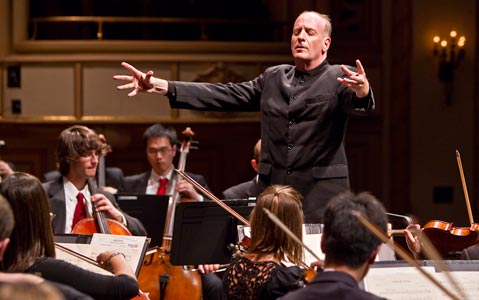Academy Festival Orchestra at the Granada
Saturday’s Opening Night Show Promises a Great Season

Conductor Larry Rachleff performed one of the year’s most impressive feats on Saturday by taking just six days of rehearsal to turn 100 gifted musicians into a full-fledged festival orchestra. From the high level of intensity given to onstage practicing and tuning up, one could have assumed that the young players were still not ready, but from the opening notes of Richard Strauss’s Don Juan, Op. 20 it was clear that the necessary unity was there.
Exploiting the dynamics not only of the large orchestra, but also of the hall’s excellent acoustics, Rachleff let this late-Romantic phenomenon roar. Strauss has had an influence on so much of 20th-century music, and not for the last time in the evening the audience was reminded of the expressive sonorities of the music’s future, as well as its past. When the piece was over, the maestro acknowledged the trumpet first, then the concertmaster, horns, and winds, but the impression was of a total effort, and it was easy to imagine the pull the music exerts on each of these young players as they lived and breathed inside it.
After the intermission, the orchestra returned to tackle two very different 20th-century classics, the Adagio for Strings, Op. 11 of Samuel Barber and the Concerto for Orchestra of Béla Bartók. Rachleff abandoned the baton for the Barber, stretching and molding the fabric of this glorious sound tapestry by hand. But the Bartók that followed required the magic wand that conjured the Strauss to return, and Rachleff once again used it vigorously.
This concerto is every bit as ambitious as a symphony and contains multitudes of complex musical ideas. In it, Bartók attempts (and mostly succeeds) to out-Stravinsky Stravinsky, and likewise Shostakovich. The brass oscillates between renaissance and baroque disciplines and the harsher sound of something more modern as the rhythms pounded out on tympanies accelerate and intensify. It’s an open-feeling piece, and a very challenging one, with knotty dilemmas posed at one time or another for nearly every section, but Rachleff and his players succeeded in keeping it afloat for the duration. Even at those moments when the composer would seem to have perhaps gone too far, the orchestra remained collected under its leader.
It’s a pleasure to think that in coming weeks we will have the opportunity to watch this huge and elegant organism grow into something beautiful and new.



